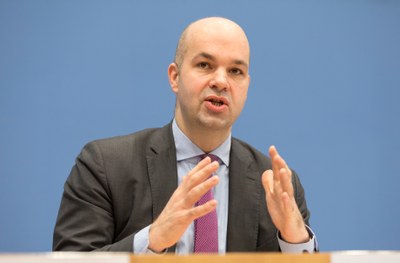For a Strong Social State and Solidarity Through Diversity

Prof. Marcel Fratzscher (PhD.) Foto: Florian Schuh (DIW)
The news spread like wildfire, drawing vehement and in part scurrilous reactions: in May Kevin Kühnert, chairman of the Jusos (young socialists in the SPD), commented in Die Zeit on the current economic order and considered possible changes. He wrote that he could imagine the socialisation of companies such as BMW; profits should be distributed democratically, he argued. The outcry was almost immediate. In contrast to many critics, Marcel Fratzscher of Humboldt-Universität showed understanding for Kühnert’s musings. These hit a nerve, says the professor for macroeconomics and president of the German Institute for Economic Research (DIW Berlin), and should be understood as a reaction to the fact that not everything is working today as it should according to the model of the social market economy. Nevertheless, Fratzscher believes that the German system is in principle the right one. ‘I am firmly convinced that we don’t need a different model’, he says in the interview.
Fair competition – not always the case today
‘One has to recognize that the social market economy has proved to be a successful model’, Fratzscher explains. ‘There is hardly a country that has needed or implemented a restart of this kind. With good reason we speak of an economic miracle, as Germany recovered very quickly after the Second World War.’ The presupposition for this success, he continues, is the social contract – occurring within the model of the social market economy – that aims at the common good. ‘Thus the problem, in my opinion, is not that we have the wrong model, but rather that the system currently is no longer functioning adequately’ – for we can actually speak of the market economy, he continues, only when there is fair competition. That is not always the case today.
Minimum wage was a first step
‘One aspect concerns major companies, such as Ikea, Apple and Amazon, that hardly pay any taxes. The small bookstore on the corner has quasi no chance against something like this.’ Fratzscher also views with concern the fact that the low-wage sector has grown significantly in recent years: More than one-fifth of all Germans who are fully employed now gross less than 2000 Euro a month. ‘In Germany around twice as many people work in the low-wage sector as in France or Scandinavia. These are people who do good work, but ultimately only receive a small part of what they produce’, the economist says critically. With the introduction of minimum wage, the first steps were taken to at least stabilize low wages. ‘And this measure has cost almost no jobs’, Fratzscher argues.
No equality of opportunity
‘It is the responsibility of the social state to give people the opportunity to lead self-determined lives’, Fratzscher insists. For this reason politicians must do more for equality of opportunity. ‘In Germany we have insufficient educational mobility: What people can attain has hitherto been dependent to an unusually high degree on the income and educational level of their parents.’ Gender and heritage have also played a role in upward mobility, underscoring the sense that things aren’t fair in Germany. In addition to discrimination against women, immigrants and single parents, a North-South and an urban-rural disparity can increasingly be observed. ‘More and more, opportunities are dependent on where you live in Germany. The life accomplishments of many people are not sufficiently recognized.’ In order to remedy this, Fratzscher calls for political interventions focussing more strongly on climate change, data security and integration. In order to strengthen the social aspects, we should consider the introduction of a solidarity-based basic income and the transformation of social services, says the economist. ‘We need a culture of support, not a culture of punishment.’
Strengthening Europe
The economist also recommends strengthening Europe. ‘Today the world is much more plural than, for instance, in the 1970s or 80s. There are many different life models. Politicians have not yet reacted sufficiently to these changes’, Fratzscher argues. He sees the solution in strengthening European institutions. The background for this, he explains, is that nationally-oriented policies have little prospect of being heard in a globalized world. ‘We need subsidiarity. Trade, climate change and monetary policy have to be addressed on a European level, not a national level.’ Fratzscher is critical of current nationalist tendencies in Europe. ‘We can only preserve national interests if we speak in Europe in a united voice. We have to attain solidarity through diversity.’
Author: Nora Lessing
Summer Special "Living together"
Episode 1 with Cultural Anthropologist Prof. Dr. Silvy Chakkalakal
Episode 2 with Sociologist Prof. Dr. Steffen Mau and his new book about his Eastern Homeland
